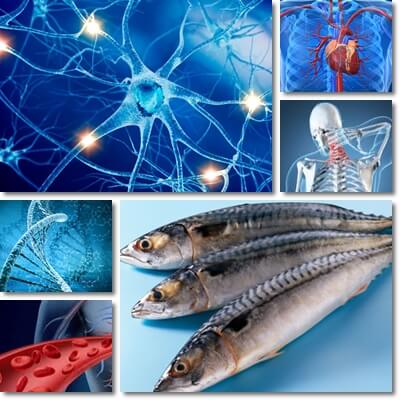Although it may not be salmon or tuna, mackerel fish is a great option for getting your healthy Omega-3 fatty acids and protein. With a high content of Omega 3, mackerel fish has wonderful cardiovascular benefits and is a top brain food. The benefits of eating mackerel extend well beyond the cardiovascular effects, providing anti-inflammatory properties that can help with arthritis pain and immune system disorders. Moreover, thanks to its vitamin and mineral content, mackerel is good for bone and skin health and boosts energy.
What is mackerel fish? A species in the Scombridae family, mackerel is a food fish related to tuna. There are multiples species of mackerel, divided into two main tribes. The Scombrini tribes comprises the true mackerels like the Atlantic mackerel, the blue mackerel or the short mackerel. The Scomberomorini tribe includes the Spanish mackerels such as the king mackerel. Mackerel is classified as a white meat fish and oily fish, two important characteristics of the species. It is also one of the species richest in healthy Omega-3 fatty acids.

What does mackerel look and taste like? Mackerel meat has an off white color with significant parts of brown muscle, which is a result of the species being an active fish which swims a lot. A darker color is not indicative of spoilt fish, unless the color is dull. Fresh mackerel should have a shiny color and clear, shiny eyes. If the head is missing or the meat has a dull color, then it’s probably not very fresh. As for the taste, mackerel is an oily fish, rich in Omega-3 and Omega-6 fatty acids. As a result, it has a richer, oilier taste. This also means that if the fish is not fresh or starts going bad, then its taste will get stronger, more fish-like.
What is mackerel fish good for?
The benefits of eating mackerel are a direct result of the Omega-3, vitamin and mineral content of the fish. Here are the 7 best reasons to eat mackerel:
1) Antioxidant and anti-inflammatory action. Mackerel is a rich source of Omega-3 fatty acids which have strong antioxidant and anti-inflammatory properties with direct benefits for brain and nervous system health, blood vessels and skin. Omega-3 fatty acids are even reported to improve arthritis pain and inflammation.
2) Better mood, sleep and appetite. Mackerel is a brain food because the form of Omega-3 it contains called DHA is physically part of our brain, particularly the gray matter. The amino acids that form the proteins in the fish meat also help synthesize neurotransmitters that regulate different functions. For example, eating mackerel can be good for your mood, improve sleep and stimulate appetite.

3) Good for the heart. Mackerel is one of the richest sources of Omega-3 fatty acids which protect blood vessels from the oxidation of fats in our blood stream which offers protection against heart disease. Omega-3 fatty acids also help lower triglyceride and LDL cholesterol and raise HDL cholesterol levels, further contributing to cardiovascular health. The cholesterol-lowering properties of Omega-3 contribute to a blood pressure-lowering effect.
4) Good for bones and osteoporosis. Mackerel contains significant amounts of vitamin D which is responsible for the absorption of calcium from food and maintaining good bone density. It is also an important source of phosphorus which is part of our bones and teeth’s composition and initiates the production of new bone. Lastly, it contains magnesium which optimizes calcium absorption and regulates vitamin D metabolism with further benefits for bone health and osteoporosis.
5) For a strong immune system. Mackerel is an excellent source of vitamins A and D, both of which boost the immune system. They play important roles in the production of white blood cells, their differentiation into specific types made to deal with various types of pathogens and diseases and regulate inflammation processes. Vitamin D for example is known to help people with immune system disorders like arthritis, dermatitis or allergies.
6) Source of protein for muscles. Mackerel is a wonderful source of quality protein that helps build and maintain muscles and contributes to energy metabolism. The amino acids that form the protein contribute to better mood, appetite and sleep by helping synthesize neurotransmitters.
7) Hair and skin benefits. Mackerel is rich in Omega-3, Omega-6 and fat soluble vitamins like vitamins A, D and E which nourish hair and skin from the inside, help them retain moisture and have a healthy appearance. Other nutrients in mackerel (B vitamins, choline, zinc) also contribute to hair, skin and nails health.
Conclusion
So why eat mackerel? Because it’s a healthy fish with similar properties to our top choices, salmon and tuna. The benefits of eating mackerel include better-looking skin and hair, improved sleep and mood and protection against cardiovascular disease in both healthy people and those with existing cardiovascular events. Its high Omega-3 content provides antioxidant and anti-inflammatory benefits, helping with arthritis pain. Moreover, thanks to its protein content, mackerel helps build and maintain muscle, while its content of vitamins A and D supports a strong immune system. Lastly, eating mackerel is good for our bones because of its generous content of magnesium, phosphorus and vitamin D, all of which regulate bone loss and bone production processes, adding to the benefits.
